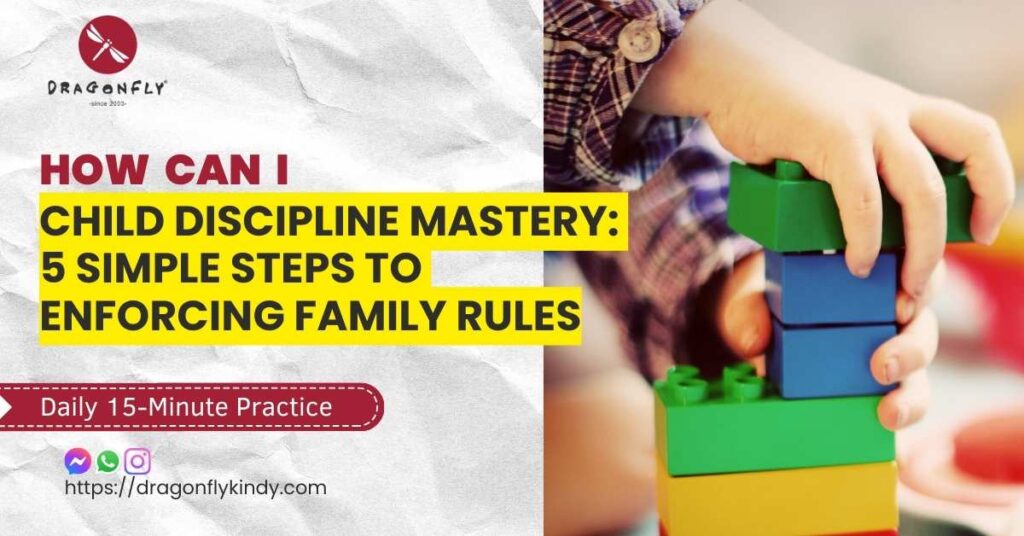- INTRODUCTION
- CASE SCENARIO
- STEP SIMPLICITY RATING
- 15-MINUTE CHILD DISCIPLINE STEP-BY-STEP GUIDE
- CONCLUSION
- START YOUR CHILD'S JOURNEY TOBUILD A SELF-RELIANT LEADER
- FREQUENCY ASKED QUESTIONS
- How can I get my child to follow rules consistently?
- Why does my child keep breaking family rules?
- What are some tips for establishing and maintaining household rules?
- How can I use child obedience techniques to help my child in situations like sneaking snacks to bed?
- What are some effective household guidelines for young children who struggle with excessive screen time?
- Are there any parental authority strategies specifically designed for elementary school-aged kids?
- How often should I practice child discipline exercises with my child?
- NEXT INTERESTED TOPICS
- THE MOST POPULAR TOPIC
INTRODUCTION #
MODERN PARENTING CHALLENGES #
In today's fast-paced world, parents face unprecedented difficulties in maintaining child discipline and enforcing rules. The importance of establishing clear boundaries and expectations cannot be overstated, as it directly impacts family relationships and a child's overall development. Progressive educational institutions like Dragonfly Preschool recognize the significance of this issue and have integrated strategies to address it within their curriculum.
REAL-LIFE RULE-BREAKING SCENARIOS #
Children often struggle with following rules, leading to various behavioral issues. For instance, a child might repeatedly sneak snacks into their bedroom despite being told not to eat in bed. Another common scenario is when children exceed their allotted screen time, disregarding parental guidelines. These behaviors may stem from a weak understanding of rules or a desire for attention and autonomy.
THE 15-MINUTE DAILY CONVERSATION PRACTICE #
To address these parenting challenges, a simple yet effective solution has emerged. The "15-Minute Daily Conversation Practice" method addresses these challenges by fostering open communication and mutual understanding between parents and children. This approach aims to strengthen family bonds and improve compliance with household rules through consistent, meaningful dialogue.

CASE SCENARIO #
To illustrate a common family communication problem related to child discipline, let’s examine the following scenario involving how to enforce rules for children:
Parent: “Emily, it’s time to put away your tablet. You’ve already had an extra 15 minutes of screen time.”
Emily: “But Mom, I’m almost finished with this level! Just five more minutes, please?”
Parent: “No, Emily. We’ve talked about this before. It’s important to stick to our screen time rules.”
Emily: (Ignoring her mother, continues playing)
Parent: (Raising voice) “Emily, I said it’s time to stop. If you don’t put the tablet away right now, you’ll lose your screen privileges for tomorrow!”
Emily: (Reluctantly puts the tablet down, but with a sullen expression) “It’s not fair! You never let me finish anything!”
Parent: “That’s enough. Go to your room and think about why following rules is important.”
In this scenario, we see a parent struggling with dealing with rule-breaking kids at home. Despite attempting to enforce the screen time rule, the parent faces resistance and ultimately resorts to threats and punishment. This approach, while common, often leads to resentment and doesn’t address the root of the problem. The “15-Minute Daily Conversation Practice” method offers a more effective alternative for handling such situations.
STEP SIMPLICITY RATING #
15-MINUTE CHILD DISCIPLINE STEP-BY-STEP GUIDE #
The “15-Minute Daily Child Discipline Conversation Practice” is a powerful tool for parents to directly engage with their children and foster better understanding and cooperation.
This method resonates with Dragonfly’s “Self-Reliant Leaders Program” as it promotes effective communication and problem-solving skills. Here’s a detailed guide on how to implement this practice:
Step 1: Set the Stage (2 minutes) #
- Choose a quiet, comfortable space for the conversation
- Ensure both parent and child are in a calm state of mind
- Briefly explain the purpose of the conversation
Example dialogue:
Parent: “Emily, I’d like us to have a special talk about what happened earlier with the tablet. Can we sit on the couch together where it’s quiet and comfortable?”
Emily: “Okay, Mom.”
Parent: “I want to understand how you felt and also explain why our rules are important. Is that alright with you?”
Emily: “I guess so.”
Parent: “Great. Let’s take a few deep breaths together to help us feel calm before we start.”
Step 2: Active Listening (4 minutes) #
- Allow the child to express their thoughts and feelings without interruption
- Use nonverbal cues to show you’re paying attention
- Reflect back what you’ve heard to ensure understanding
Example dialogue:
Parent: “Can you tell me how you felt when I asked you to stop using the tablet?”
Emily: “I was really frustrated! I was so close to finishing my game, and it felt unfair to stop.”
Parent: “I see. It sounds like you were feeling frustrated because you were close to achieving something important to you. Is that right?”
Emily: “Yeah, exactly! And it’s not just about the game. Sometimes I feel like I never get to finish anything I start.”
Parent: “That must be really disappointing. I can understand why you’d feel that way. Thank you for sharing that with me, Emily. I’m listening and I want to understand more.”
Step 3: Empathize and Validate (3 minutes) #
- Acknowledge the child’s feelings without judgment
- Share a similar experience from your own life if applicable
- Explain the importance of rules while showing understanding
Example dialogue:
Parent: “I understand how frustrating it can be to stop something you’re enjoying. I sometimes feel the same way when I have to stop reading a good book to make dinner.”
Emily: “Yeah, it’s really annoying!”
Parent: “I get that. Your feelings are totally valid, Emily. At the same time, rules like screen time limits are important for our health and to make sure we have time for other activities. How do you think we could make this easier while still keeping our rules?”
Emily: “Maybe… if I knew exactly how much time I had left?”
Parent: “That’s a great idea. I’m glad you’re thinking about solutions. Let’s explore that more.”
Step 4: Collaborative Problem-Solving (4 minutes) #
- Invite the child to suggest solutions
- Offer your own ideas and discuss pros and cons
- Work together to find a mutually acceptable solution
Example dialogue:
Parent: “You mentioned knowing how much time you had left. What if we set a timer together at the start of your screen time?”
Emily: “That could work. Can we also maybe have longer screen time on weekends?”
Parent: “That’s an interesting suggestion. Let’s discuss that. How about an extra 30 minutes on Saturdays if all your chores are done?”
Emily: “That sounds fair. Could we also have a 5-minute warning before time is up?”
Parent: “Excellent idea! I like how you’re thinking about this. Let’s add that to our plan.”
Step 5: Establish Clear Expectations (2 minutes) #
- Summarize the agreed-upon solutions
- Clearly state the consequences for not following the rules
- Ensure the child understands and agrees to the new plan
Example dialogue:
Parent: “Okay, let’s recap. We’ll set a timer for your screen time, give a 5-minute warning, and you’ll get extra time on Saturdays if chores are done. If the rules aren’t followed, we’ll have another conversation to understand why and how we can do better. Does this sound fair to you?”
Emily: “Yes, I think I can do that. And you promise to give me the 5-minute warning?”
Parent: “Absolutely. I’ll make sure to do that. And if I forget, please remind me politely.”
Emily: “Deal!”
Parent: “Great! I’m proud of how we worked this out together. Let’s give it a try and see how it goes. Remember, if we have any problems, we can always talk about it again using these steps.”
CONCLUSION #
The “15-Minute Daily Conversation Practice” method offers a valuable approach to improving child discipline and fostering better family communication. By dedicating focused time each day to open dialogue, parents can address behavioral issues more effectively and build stronger relationships with their children. This approach aligns well with Dragonfly’s “Building Self-Reliant Leaders” philosophy, emphasizing the importance of nurturing independence and responsibility in children.
Consistency is key when implementing this practice. Parents should commit to regular sessions and not give up, even if progress seems slow at first. It’s important to remember that changing behavior patterns takes time, and there may be challenges along the way. Patience and persistence will ultimately lead to positive results.
It’s worth noting that parental factors can also contribute to communication issues. For example, inconsistent rule enforcement or lack of clear expectations can lead to confusion and rule-breaking behavior in children. Dragonfly addresses these challenges through strong parent-school partnerships, emphasizing the importance of consistency across all environments in a child’s life.
START YOUR CHILD'S JOURNEY TOBUILD A SELF-RELIANT LEADER #
FREQUENCY ASKED QUESTIONS #
How can I get my child to follow rules consistently? #
Establish clear expectations, use positive reinforcement, and maintain open communication through regular conversations.
Why does my child keep breaking family rules? #
Children may break rules due to a lack of understanding, seeking attention, or testing boundaries. Consistent communication can help address these issues.
What are some tips for establishing and maintaining household rules? #
Involve children in rule-making, explain the reasons behind rules, and use the 15-minute conversation method to reinforce and discuss rules regularly.
How can I use child obedience techniques to help my child in situations like sneaking snacks to bed? #
Use the 15-minute conversation to understand the underlying reasons, set clear expectations, and work together to find alternative behaviors.
What are some effective household guidelines for young children who struggle with excessive screen time? #
Set clear time limits, use visual timers, offer alternative activities, and consistently enforce rules using the 15-minute conversation method.
Are there any parental authority strategies specifically designed for elementary school-aged kids? #
Yes, techniques like the 15-minute conversation practice, positive reinforcement, and collaborative problem-solving are particularly effective for this age group.
How often should I practice child discipline exercises with my child? #
Aim for daily 15-minute conversations, but at minimum, try to have these focused discussions 3-4 times a week for consistent results.
NEXT INTERESTED TOPICS #
Mastering child discipline and enforcing family rules are crucial for creating a structured and harmonious home environment. The following topics build upon this foundation, addressing how to develop child independence and teach sharing. These skills are essential for fostering self-reliance, social competence, and a balanced understanding of rules and personal freedom in children.

CHILD INDEPENDENCE DEVELOPMENT #
After establishing a framework for discipline and rules, encouraging child independence is a natural progression. This skill is crucial for building self-confidence and decision-making abilities.
Why it’s important:
- Builds on the structure provided by family rules
- Encourages self-reliance within established boundaries
- Helps children understand the balance between freedom and responsibility
- Fosters a sense of accomplishment and self-esteem
This skill complements discipline by teaching children how to make good choices independently, reinforcing the rules they’ve learned through their own decision-making process.
TEACHING KIDS TO SHARE #
Learning to share is a crucial social skill that naturally follows understanding family rules and developing independence. This skill promotes empathy and cooperation.
Why it’s a natural progression:
- Applies the concept of rules to social interactions
- Helps children understand fairness and consideration for others
- Encourages the application of discipline in social settings
- Develops important interpersonal skills
Mastering the ability to share complements discipline and rule-following by extending these concepts to peer interactions. It helps children understand how the principles of family rules apply in broader social contexts, further developing their social and emotional intelligence.





